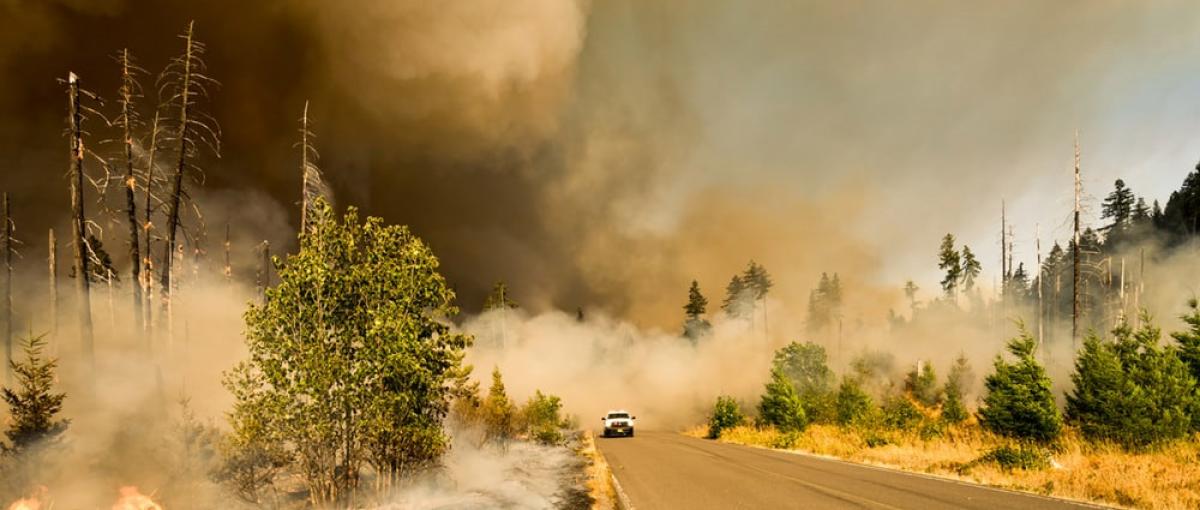Wildfire smoke takes a toll on children's health

August 20, 2019
By Rey Rosales, Storytelling Advisor, Covenant Health
She thought everything would go back to normal when their house appeared untouched by the raging wildfire that tore through Fort McMurray.
But a few months after being told it was safe to return home, her two sons, Zac, then 14, and Colby, 6, became sick, requiring numerous trips to hospitals and clinics.
“My eldest son often has tremors, headaches and all kinds of pain. Aside from physical and mental health challenges, he also developed learning difficulties,” says Tracy Harris, 48, whose family was affected by the 2016 Fort McMurray wildfire which left hundreds of families without a home.
It took months after returning home to find that the boys may have been harmed by fire-related pollutants in the home, says Tracy.
Today, both boys often have a tough time sleeping at night. They often have difficulty breathing especially when smoke, dust or particles are present in the environment, she adds.
“My kids sometimes gave off this bad smell from their hair and their behaviour was also off when the smell was stronger.” It was one of the symptoms she noticed months after moving back in, says Tracy.
Poor air quality poses both short- and long-term health risks to children, including babies in a mother’s womb, says Dr. Irena Buka, Director of the Children’s Environmental Health Clinic at the Misericordia Community Hospital.
Smoke and other environmental pollutants affect children’s health in a number of ways and chief among them is the respiratory system, says Irena. “The more immediate impact to a child’s health can be anything from irritation of the eyes, ears, throat and coughing as well as triggering of asthma.”
She says such symptoms are a reflection of inflammation in our bodies which can take time to heal before the symptoms go away. She adds long-term consequences to children’s health may also occur.
“Smoke can be particularly hard on kids, especially those with asthma or other pre-existing respiratory conditions,” says Irena.
And for kids who have been evacuated or lost their home to a fire, the consequences go beyond smoke exposure, adds Irena.
“We have to consider the impact to their mental health and mental well-being, especially those who live in communities where they were evacuated or separated from family members.”
Irena says these kids may be experiencing anxiety and some could be showing signs of post-traumatic stress disorder (PTSD.) “It is important for parents to seek professional help for the kids directly affected by the wildfire.”
Pollutants at home
In Tracy’s case, her son Zac was initially diagnosed with PTSD, however, she wasn’t convinced it was the case. She says tests show pollutants were in her home.
“If the house had been tested first before we were advised to move in, it would have completely changed everything,” believes Tracy.
Due to their high level of concern, Tracy and her husband Gary, 54, decided to buy a mobile home and put it next door, where the family now lives.
Tracy often consults with the doctors at the children’s environmental clinic at Misericordia hospital about treatment options and advice on how to manage the myriad of health problems that her kids continue to experience.
“When the outdoor air quality is poor, we make sure the boys stay indoors,” says Tracy.
Tracy says they also made a lot of lifestyle changes from making sure the family eats healthy to using natural cleaning products in their home. “They tend to help ease the things that they are going through.”
Tracy anticipates her children’s recovery will be long.
Air quality and pregnancy
Wildfire smoke and environmental pollutants can heighten the health risks for pregnant women and babies, notes Irena.
Research, including work done by teams at the Misericordia clinic, shows that babies exposed to smoke and particles from wildfire in utero also face some health risks, says Lesley Brennan, Researcher and Clinical Assistant at the Misericordia children’s environmental clinic.
“Pregnant women need to be aware of exposures to smoke and its particles because of the potential harmful impact to their body and to the baby.”
Part of Lesley and Irena’s mandate at the environmental children’s clinic is not only to assess and manage patients but also to conduct clinical research and help educate people about environmental health risks and their impact on children. The clinic is the only one of its kind in Canada and it has been designated as a World Health Organization Collaborating Centre.
Irena notes that smoke and poor air quality can contribute to babies being born prematurely.
“And when a baby is born prematurely, we then see a cascading effect on their life from having asthma problems, school learning problems, plus other health and life challenges.”
If wildfires continue to occur regularly, exposing children to smoke, then we can expect increasing health issues over the long-term, says Irena.
“We can already predict and expect that asthma will continue to increase in numbers and severity, more mental health problems, learning problems in school and poor pregnancy outcomes as a result of continued exposure to smoke and other environmental hazards.”
Dealing with the health consequences of the smoke from wildfires and other pollutants requires a concerted action on the part of everyone, says Irena. “We all can contribute to solutions whether it is putting resources and the right policies in place, educating people about environmental hazards and better prevention or reducing our personal carbon footprint.”